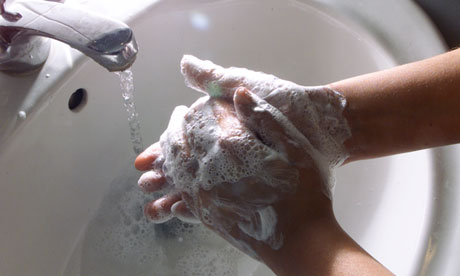
British people were half as likely as those in four other countries to cover their mouths more frequently when coughing or sneezing during the swine flu pandemic of 2009, according to a paper in the journal Lancet Infectious Diseases. The researchers asked 900 randomly chosen adults in Japan, Mexico, Argentina, the US and the UK about the hygiene habits they used to reduce the spread of H1N1 swine flu. In the UK, a little more than half said they had washed their hands more frequently, compared with nearly 90% of Argentinians. Despite advice to cough or sneeze into our elbows, only a quarter of people in the UK said they did so. In Mexico, it was more than three-quarters.
Now that the cold and flu season is coming round again, should we be more hygienic? The World Health Organisation estimates that 80% of all virus infections worldwide are caused by poor hygiene. The biggest concern is inadequate hand washing. So which practices work, and how can you strike a balance between careful and obsessive?
The solution
Most colds and flu are spread by viral droplets in coughs and sneezes or by viral particles being left on a surface, picked up on fingers and introduced into the body through the eyes, mouth or nose. Viruses and bacteria that cause vomiting and diarrhoea are also spread by hands.
Keep your hands as germ-free as possible by washing them thoroughly using warm water and soap – these are more effective than just using sanitised sprays. The technique recommended by the Health Protection Agency involves rubbing palms together, interlocking hands and washing carefully between the fingers for 20 seconds. You should wash your hands at the flimsiest excuse to protect yourself and others, but especially after sneezing or coughing into your hands, going to the toilet, petting a dog, gardening, changing a nappy, preparing uncooked food, handling rubbish and taking care of anyone who is sick. Dry your hands thoroughly or the viruses and bacteria cling on. There is evidence that paper towels get rid of more germs than air hand dryers, but trials are almost all sponsored by industry, with positive results for whoever funded the research.
If your child keeps coming home from school with tummy bugs or colds, check they are washing their hands. A survey by Initial Hygiene of 50 children in the UK aged seven to 11 found that 40% said they didn't wash their hands with soap after using the toilet, and three-quarters didn't do so before meals.
Don't leave used hankies or tissues lying around. If someone in the house has a cold, wash communal surfaces such as door handles with hot soapy water or antibacterial cleaner. Keep your hands away from your mouth, nose and eyes.
You also may want to choose kissing over hand shaking as a form of greeting during the winter months (ideally air kissing). Surveys reportedly show that shaking hands transfers germs very effectively.
• This article was amended on 16 October 2012. The original said that 500 children were surveyed by Initial Hygiene, when in fact 50 were.

